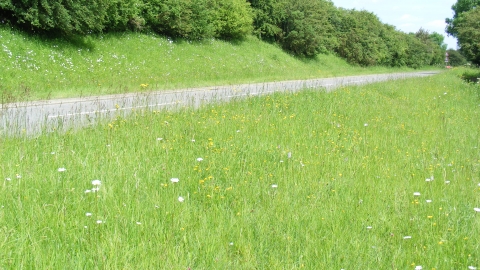Lincolnshire Wildlife Trust

Lincolnshire Wildlife Trust
Lincolnshire Wildlife Trust
South Witham Verges
Know before you go
Dogs
Assistance dogs only
When to visit
Opening times
Open at all timesBest time to visit
April to JulyAbout the reserve
When the A1 was upgraded to a dual carriageway in 1970, the old South Witham-Castle Bytham road was realigned along a disused railway line. The cutting was widened to allow for two lanes of road traffic; the north bank is part of the original cutting and the south a newly created one. The reserve includes grassy banks and verges and large areas of scrub and hedgerows.
There is a rich limestone flora on the grassland consisting of such specialised flowering plants as kidney vetch, eyebright, yellow rattle, oxeye daisy, bee orchid, common knapweed, blue fleabane and fairy flax. There are also extensive areas of early dog-violet, cowslip, wild carrot, wild parsnip, bird's-foot trefoil, black medick, melilot, beaked hawk's-beard, red bartsia and glaucous sedge, and many grasses.
28 species of butterfly have been recorded, including five kinds of skipper, green hairstreak, clouded yellow, small heath and dark green fritillary. Mammal records include fallow and muntjac deer, badger, fox, stoat, weasel, pygmy shrew and harvest mouse.
The scrub on the higher slopes consists of hawthorn, blackthorn, hazel, sallow, dogwood, gorse and rose. A wild pear can also be seen, only the second to be recorded in the county. The scrub forms what is probably an optimal habitat for songbirds, with blackbird, song thrush, robin, dunnock, wren, long-tailed tit, greenfinch, bullfinch and yellowhammer being regular breeding species. Altogether 100 bird species have been recorded of which 34 have bred.
In the ditches grow common spotted-orchid, meadowsweet, marsh thistle, great willowherb, common fleabane, water-cress, great reedmace, yellow iris and false fox-sedge. The floristic diversity is maintained by an annual cut of the grass and selected scrub, particularly thorn, rose and ash, which is done after the flowering season in September or October. This has encouraged an increase in early dog-violet, kidney vetch and oxeye daisy, and orchids have appeared in new areas.
Nearest postcode NG33 4SR. Please note - postcodes are for the nearest registered address as we are unable to get postcodes for nature reserves.
Location information
South Witham Verges location PDF
